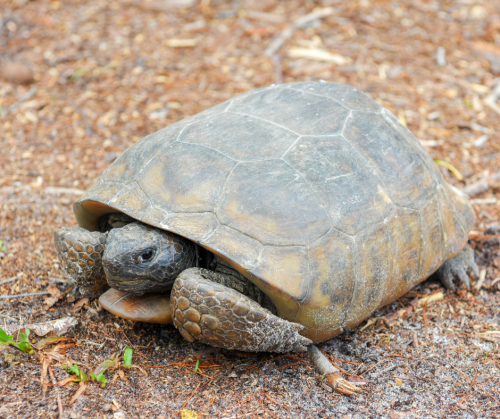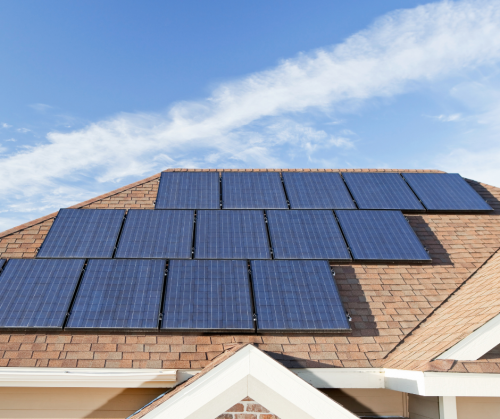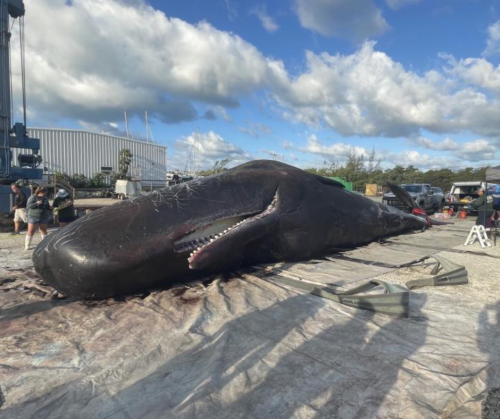To pair with the rest of our educational content in each Earth to Florida newsletter, we bring you monthly updates on statewide environmental news. Read on below to see what we found for the month of May:
15 Florida Stories to Watch

- As development persists, habitat for gopher tortoises is dwindling in Florida. After a settlement with the Center for Biological Diversity this week, the U.S. Fish and Wildlife Service must determine by September 30 if gopher tortoises in Florida and surrounding states should be listed as threatened or endangered under the Endangered Species Act. The announcement of the settlement came after recent steps by Florida wildlife officials and lawmakers to increase the sites where these tortoises can be moved, including a bill that would, in part, direct state agencies to consider designating some public lands as “recipient” sites for the species.
- A deadly strain of avian influenza has made its way to the Tampa Bay area, killing numerous Florida birds. So far, the virus is only known to have infected wild birds in the state, but the outbreak could potentially reach domesticated turkeys and chickens. Experts say this strain does not appear to pose a threat to humans.
- In 2021 more manatees died than in any other year on record, but now Florida is set to spend $30 million on recovery efforts, including improving manatee access to the springs. Some funds will also be used for rescue and rehabilitation as well as aerial surveys to track and monitor the species.
- A controversial bill regarding the management of water levels in Lake Okeechobee is awaiting approval from Governor DeSantis, but many are asking him to veto it. Environmental groups such as Friends of the Everglades have been outspoken about their opposition to the bill, arguing that it would create water management rules that favor the sugar industry at the expense of surrounding estuaries. But supporters say the bill helps ensure a stable water supply for municipalities even during a drought. The governor has until June 30 to sign, veto, or allow Senate Bill 2508 to pass into law without his signature.
- Governor Ron DeSantis has pledged to spend $14 million to manage red tide in Florida, much of which will go toward recovery in the Tampa Bay area, as well as the Fish and Wildlife Research Institute at the University of South Florida, and Mote Marine Laboratory in Sarasota.
- The Florida Communities Trust approved plans for a toll road through the Split Oak Forest, currently a protected woodland. The forest, located in central Florida, has been protected since the 1990s and provides habitat for several imperiled species, including the gopher tortoise. Friends of Split Oak, a local nonprofit organization, is currently considering legal options.
 Gov. Ron DeSantis has vetoed a bill that would have changed the rules for rooftop solar energy. The bill would have regulated net-metering, an incentive that allows rooftop solar owners to receive bill credits in exchange for sending excess energy back to electric utility companies. Had it passed, the rate of the credits that solar owners receive would have been significantly reduced which critics of the bill said could have reduced homeowners’ and businesses’ interest in adopting rooftop solar energy.
Gov. Ron DeSantis has vetoed a bill that would have changed the rules for rooftop solar energy. The bill would have regulated net-metering, an incentive that allows rooftop solar owners to receive bill credits in exchange for sending excess energy back to electric utility companies. Had it passed, the rate of the credits that solar owners receive would have been significantly reduced which critics of the bill said could have reduced homeowners’ and businesses’ interest in adopting rooftop solar energy.- A new study from First Street Foundation suggests that the risk of wildfires could double by midcentury. Because Florida is highly developed, more property is vulnerable than in many other states. First Street has also created a tool to help property owners assess fire risk. Currently, areas in South Florida near the eastern border of the Everglades face the biggest risk.
- Nearly $20 million in grant funding will be awarded through the Resilient Florida Program to support risk assessment for impacts from sea level rise, storm surge and rainfall events. The funds will be distributed across 98 projects throughout the state, with a majority in coastal areas. Out of Florida’s 67 counties, Miami-Dade will receive the largest number of project grants. The governor also signed a bill that will create a new Statewide Office of Resilience to address the impacts of flooding and sea level rise on the state.
- A study led by the Tampa Bay Estuary Program found that excess nutrients from the 2021 wastewater leak at Piney Point likely made red tide worse. The study found that the water leaking from the former phosphate processing facility released a year’s worth of algae-fueling nutrients in just 10 days. Now, researchers from the University of South Florida are using remote sensors to better understand the movement of water so they can track where nutrients might end up. In early May, the Florida Department of Environmental Protection approved a plan to speed up the closure of the plant. Explore our timeline to learn more about the long and troubled history of the site.
- A political committee called Florida’s Right to Clean Water has proposed a constitutional amendment to make clean and healthy water a fundamental right for Floridians. The measure would allow lawsuits against state agencies for any harm to the state’s waterways. To make it on the 2024 ballot, the committee needs 891,589 petition signatures by February 2023.
- Lyngbya, a type of blue-green algae commonly known as “gumbo algae” has made an appearance in Sarasota Bay waters. Locals say small Lyngbya blooms are typical every few years. But this year, the bloom spans several thousand acres. Mats of the thick algae can make it hard for seagrass below to photosynthesize and grow, and can get caught in boat motors. Once the algae starts to decay, it emits a foul smell, which can turn tourists away.

Photo Credit: Florida Fish and Wildlife Conservation Commission (FWC), Photo taken under MMPA/ESA permit no. 18786 - A 47-foot male sperm whale was found stranded in the shallow waters of Mud Keys, a group of islands north of Key West, where it later died. According to necropsy results, large amounts of fishing line, net material and plastic bag material were found in the whale’s stomach. Scientists say the debris may have made it difficult for the whale, who appeared emaciated, to digest food and absorb nutrients. Sperm whales are typically spotted roaming in deep waters offshore. Just a few weeks prior to this stranding, a female sperm whale calf was found stranded in Key Largo – results from that necropsy are still pending.
- A viral video showing people dumping balloons into Biscayne Bay has sparked a petition to ban balloons from state waters. Florida law currently prohibits the release of more than 10 balloons in a 24-hour period. Two people were arrested and are facing felony charges for willful and reckless disregard for the environment. Multiple other people and event organizers were fined more than $25,000.
- A special session of the Florida Legislature convened on Monday, May 23 to address the state’s worsening property insurance crisis. In a state rife with natural disasters and claims fraud, property insurers are leaving the state in droves, leaving Floridians to find coverage elsewhere at rates up to 50% higher. This week lawmakers are working to secure billions of dollars prior to the start of hurricane season for a reinsurance fund. Without reinsurance, or “insurance for insurance companies,” insurers say they won’t have enough money to cover payouts for catastrophic events.
The Good News
- Based on a new report by the Sarasota Bay Estuary Program, water chemistry and quality in the bay are generally good and improving. Most areas show an increase in water transparency which is critical for healthy seagrass populations. Better management of wastewater in the surrounding areas may be the reason behind these improvements.
- Fishermen are currently testing ropeless gear that will eliminate the risk of whales getting tangled in fishing ropes. With this new technology, ropes are contained within the fishing trap until remotely released by the fisherman’s cellphone or tablet when ready to be picked up. These sustainable traps were featured in the Canadian documentary Last of the Right Whales which emphasizes the importance of protecting North Atlantic right whales, a species that is on the brink of extinction.
- The Miami-Dade County Public School District, the largest employer in Miami, will soon be hiring its first sustainability officer. The position will be tasked with helping to reduce the school district’s carbon footprint and move toward a clean energy future.
Things You Can Do
- Stormwater infrastructure in Florida is designed to mitigate flooding by redirecting rainfall to local bodies of water or using infiltration basins to collect water and encourage it to seep into the ground. However, as the water travels over impermeable surfaces like streets, it has more opportunities to pick up urban contaminants like fertilizers, pesticides, and bacteria. You can be a good stormwater neighbor by trapping and storing stormwater on your own property to encourage infiltration before any urban contaminants can be collected. Use rain barrels and cisterns to capture and reuse rainwater, and transform your downspout into a rain garden using gravel, soils, and native plants that store and treat stormwater.
- Expand your sustainability journey into the kitchen with these 5 tips on how to make your kitchen eco-friendly. To start, get creative with your cooking by using all parts of your produce, reusing your water as much as possible, and using your cooktop efficiently for low-waste and low-energy cooking. Similarly, avoid food waste by taking home your leftovers from restaurants in reusable containers. Finally, replace the need for buying Mason jars by washing and reusing old jars from salsa, jam, or anything else you already have.
Florida Research News
- Researchers from the Florida A&M University-Florida State University College of Engineering’s Resilient Infrastructure and Disaster Response Center (RIDER) are working to improve predictions of where road-clogging debris will be most severe following extreme weather events. The team used satellite images to measure post-storm vegetation before and after two tropical storms and three hurricanes. They found that debris was heavier in suburban and urban areas, where there is a higher density of people and roads. Access to safe and uninterrupted road travel is essential so that fallen power lines can be removed, people can access medical care, and communities can begin to recover.
- Scientists from the University of Florida have grown plants in soil from the moon. In their new journal article, the researchers studied how plants responded to the moon’s soil and found differences in these plants’ growth, such as decreased size and slower growth rates. Although these observations implied that the plants perceived the moon’s soil as a stressful environment, this achievement marks the next step in successfully growing plants for food and oxygen in outer space.
- Researchers from Florida International University’s Bonefish & Tarpon Trust (BTT) discovered that the blood and tissue of bonefish living off the South Florida coast are tainted with pharmaceuticals. Fish contaminated with these substances may experience behavior changes that could jeopardize their survival. According to BTT president and CEO Jim McDuffie, pharmaceuticals are often overlooked contaminants that may pose a threat to Florida’s recreational saltwater fishery.
National News
- A coalition of utility groups has filed a petition against the U.S. Environmental Protection Agency, arguing that the agency issued new regulations on coal ash without notice. Coal ash is the waste that remains once coal has been burned for electricity. It is also the leading source of water contamination in the country and contains toxic substances linked to cancer. The recent changes from the EPA could affect more than 200 coal power plants and nearly 750 coal ash ponds and landfills across the nation.
- According to research from Beyond Plastics and the Last Beach Cleanup, in 2021 recycling rates in the United States fell below 6%. This number is down from 8.7% in 2018. In 2019, the U.S. EPA expressed a goal to achieve a 50% recycling rate by 2030 in the country’s first national recycling strategy. The administration has not published official recycling rates since 2020.
- Earlier this month, the Biden administration announced it would not sell three oil and gas leases in the Gulf of Mexico and Alaska, citing lack of interest and legal obstacles. The sales would have needed to be completed by the end of June when the current offshore drilling program is set to expire. No replacement plan has been announced, but officials say the administration is working on a proposal to move forward. The move has received praise from environmental groups and criticism from the oil and gas industry.
- The recently released 2021 climate summary from the World Meteorological Organization showed record-breaking increases in ocean heat, sea level rise, greenhouse gas concentrations and ocean acidification. The news was no better in the climate outlook report for summer 2022 — every state in the U.S. has a probability of higher-than-average temperatures, with many projected to experience drought. Another study from the Journal of the American Medical Association has found that rising temperatures due to climate change can be linked to higher death rates.
The More You Know
- A team of scientists from the University of Cambridge analyzed more than a million satellite images and found a net loss of more than 1,500 square miles of tidal wetlands around the world over the last two decades. Their research indicates that about 27% of losses and gains in tidal wetlands were connected to direct human activity like conversion to agricultural lands and wetland restoration efforts. Other changes were linked to indirect drivers like coastal subsidence, natural coastal processes, and climate change.
- According to a new report, more than one in five reptile species worldwide are threatened with extinction. Despite evolutionary historical significance and importance in ecosystems, reptiles are often less prioritized than mammals and other classes of animals when it comes to conservation efforts. The list includes animals such as the king cobra, the Galapagos marine iguana, and several species of sea turtles. Habitat destruction is currently the greatest threat to reptiles worldwide, followed by climate change, invasive species, and hunting.
- A new study is exploring the formation and stability of greenhouse gases trapped as hydrate crystals in the world’s oceans. By studying the conditions in which this “fire ice” forms within the nanopores of sedimentary materials in a range of deep marine environments, scientists will gain an understanding of how these important hydrocarbons will behave under changing ocean temperatures and pressures. One of the trapped gases, methane, can warm Earth 30 times more efficiently than carbon dioxide, leading to the question: As oceans warm will the methane ‘Kraken’ be released?